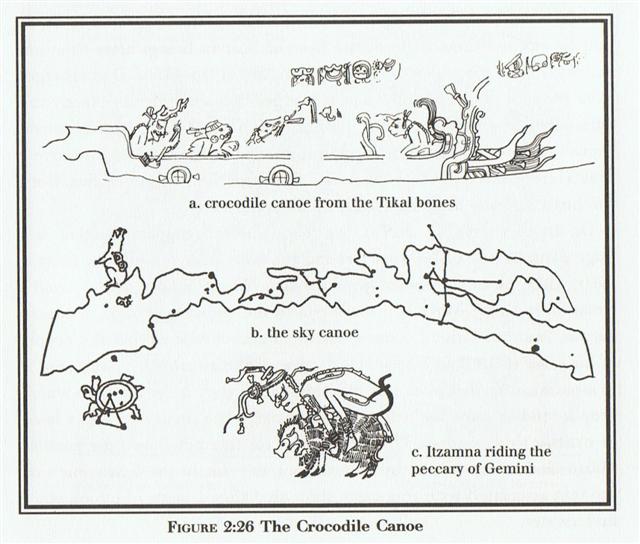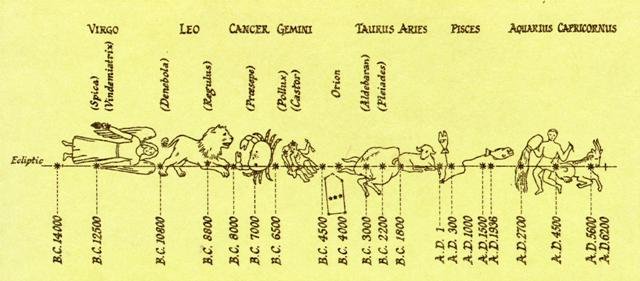399. Cassiopeia was in the Milky Way
River (the Níle) but
Andromeda was not:
The precession had moved them both
ahead in the year to the Gregorian 0h - which anciently should have
been at the December solstice rather than in March 21 - but neither of them belonged in
the zodiac:
Assuming Betelgeuze had been the basic ancient
point of spring equinox, the precession would since then
have pushed the
Sun to a position 88 right ascension days earlier (than around 4500 BC).
*88 * 26000 / 365.25 = 6264 = 1842 AD + 4422 BC.
... Lifting
a huge doorstone, such as two and twenty good
four-wheeled [22 * 4 = 88] wains could not have raised
from the ground, he set this against the mouth of the
cave, sat down, milked his ewes and goats, and beneath
each placed her young, after which he kindled a fire and
spied his guests. Two were
eaten that night for dinner, two the next morning for
breakfast, and two the following night. (Six gone.) But
the companions meanwhile had prepared a prodigous stake
with which to bore out the Cyclops' single eye; and when
clever Odysseus, declaring his own name to be Noman,
approached and offered the giant a skin of wine,
Polyphemus, having drunk his fill, 'lay back', as we
read, 'with his great neck bent round, and sleep that
conquers all men overcame him.' Wine and fragments of
the men's flesh he had just eaten issued forth from his
mouth, and he vomited heavy with drink.
'Then', declared Odysseus, I thrust in that stake under
the deep ashes, until it should grow hot, and I spake to
my companions comfortable words, lest any should hang
back from me in fear. But when that bar of olive wood
was just about to catch fire in the flame, green though
it was, and began to glow terribly, even then I came
nigh, and drew it from the coals, and my fellows
gathered about me, and some god breathed great courage
into us. For their part they seized the bar of olive
wood, that was sharpened at the point, and thrust it
into his eye, while I from my place aloft turned it
about, as when a man bores a ship's beam with a drill
while his fellows below spin it with a strap, which they
hold at either end, and the auger runs round continually
...
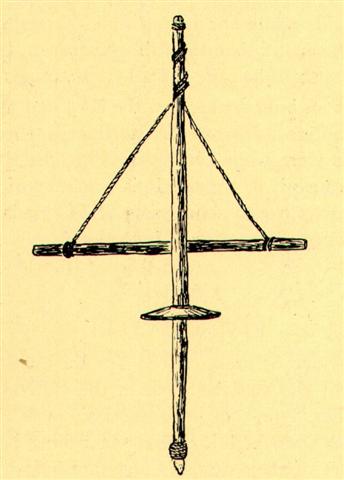
|
APRIL 7 |
8 (*18) |
9 (*19) |
10 (100) |
11 |
|
... In China, every year about the
beginning of April, certain officials
called Sz'hüen used of old to go
about the country armed with wooden
clappers. Their business was to summon
the people and command them to put out
every fire. This was the beginning of
the season called Han-shih-tsieh,
or 'eating of cold food'. For three days
all household fires remained extinct as
a preparation for the solemn renewal of
the fire, which took place on the fifth
or sixth day after the winter solstice
[Sic!] ... |
 |
 |
 |
 |
 |
|
Ga1-17 |
Ga1-18 → 118 |
Ga1-19 |
Ga1-20 |
Ga1-21 |
|
ψ Orionis (81.1), NIHAL = β Leporis
(81.7) |
Han-shih-tsieh |
ο Aurigae (85.8), γ Leporis (85.9)
YANG MUN (α
Lupi)
|
|
KHUFU |
KHAFRE |
MENKAURE |
|
MINTAKA (Belt) = δ Orionis,
υ Orionis (82.4), χ Aurigae (82.5), ε
Columbae (82.6)
*41 = *82.4 - *41.4 |
Al Hak'ah-3 (Brand) /
Mrigashīrsha-5 (Stag's Head) /
Turtle Head-20 (Monkey) /
Mas-tab-ba-tur-tur (Little
Twins)
ARNEB = α Leporis, Crab Nebula = M1
Tauri
(83.0, φ¹ Orionis (83.1),
HEKA = λ Orionis, Orion Nebula = M42
(83.2), φ² Orionis (83.6),
ALNILAM (String of Pearls) = ε Orionis
(83.7) |
Three Stars-21 (Gibbon) /
Shur-narkabti-sha-shūtū-6 (Star in the
Bull towards the south)
/
ANA-IVA-9 (Pillar of exit)
HEAVENLY GATE = ζ Tauri,
ν Columbae (84.0), ω Orionis (84.2),
ALNITAK (Girdle) = ζ Orionis, PHAKT
(Phaet) = α Columbae
(84.7) |
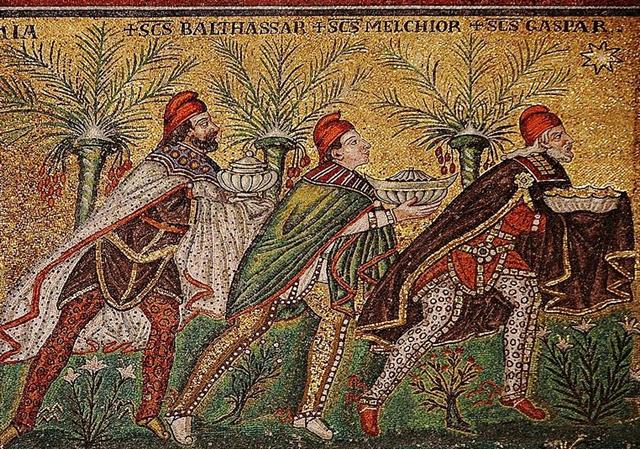 |
|
June 10 (161) |
11 |
12 |
13 (*84) |
14 (165) |
|
... The month, which takes its name from
Juppiter the oak-god, begins on June
10th and ends of July 7th. Midway comes
St. John's Day, June 24th, the day on
which the oak-king was sacrificially
burned alive. The Celtic year was
divided into two halves with the second
half beginning in July, apparently after
a seven-day wake, or funeral feast, in
the oak-king's honour ... |
|
°June 6 (*77) |
7 |
8 |
9 (*80) |
10 |
|
'May 14 (*54) |
15 (500 = 365 + 135) |
16 (136) |
17 |
18 (*58) |
|
"April 30 (*40) |
"May 1 (121) |
2 |
3 (133) |
4 (*54) |
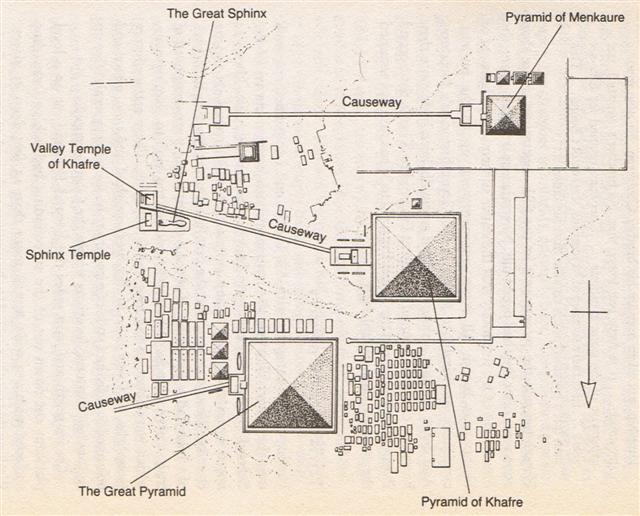 |
|
APRIL 12 |
13 → 14 * 29½ |
14 (104) |
15 |
16 (*26) |
 |
 |
 |
 |
 |
|
Ga1-22 |
Ga1-23 |
Ga1-24 |
Ga1-25 |
Ga1-26 |
|
μ
Columbae,
SAIPH (Sword) =
κ
Orionis
(86.5),
τ
Aurigae,
ζ
Leporis (86.6) |
υ
Aurigae (87.1),
ν
Aurigae (87.2),
WEZN (Weight) =
β
Columbae,
δ
Leporis (87.7),
TZE (Son) =
λ
Columbae
(87.9) |
Ardra-6 (The Moist One) /
ANA-VARU-8 (Pillar to sit by)
χ¹
Orionis,
ξ
Aurigae (88.1),
BET-EL-GEUZE (Birth
House of the Giant) =
α
Orionis
(88.3),
ξ
Columbae (88.5),
σ
Columbae (88.7)
ZUBEN
ELGENUBI (α Librae)
|
η
Leporis (89.0),
PRAJA-PĀTI (Lord of Created Beings)
=
δ
Aurigae, MENKALINAN (Shoulder of the
Rein-holder) =
β
Aurigae, MAHASHIM (Wrist) =
θ
Aurigae,
and
γ
Columbae (89.3),
π
Aurigae (89.4),
η
Columbae (89.7)
*48 = *89.4 - *41.4 |
μ Orionis (90.3), χ² Orionis (90.5) |
|
...
Like the names of most other Greek
letters, the name of beta was
adopted from the acrophonic name of
the corresponding letter in
Phoenician, which was the common
Semitic word *bayt ('house').
In the system of Greek numerals
beta had a value of 2.
... The building of new houses was
obviously the result of (male)
births in the royal family. In each
case, the house that was built last
is left to the newborn son and his
mother, together with a specific
servant, while the king has a new
and separate residence constructed
for himself
... |
|
June 15 |
16 |
17 (☼84) |
18 |
19 |
|
°June 11 |
12 |
13 (*84) |
14 |
15 |
|
'May 19 |
20 |
21 (141) |
22 |
23 (*63) |
|
"May 5 |
6 |
7 (127) |
8 |
9 (*49) |
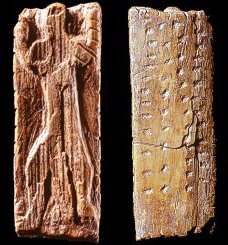
... The
earliest depiction that has
been linked to the
constellation of Orion is a
prehistoric (Aurignacian)
mammoth ivory carving found
in a cave in the Ach valley
in Germany in 1979.
Archaeologists have
estimated it to have been
fashioned approximately
32,000 to 38,000 years ago
...
The artist cut, smoothed and
carved one side (A)
and finely notched the other
side (B) and the
edges. Side A
contains the half-relief of
an anthropoidal figure,
either human or a
human-feline hybrid, known
as the 'adorant' because its
arms are raised as if in an
act of worship.
|
Egyptian
jubilation |
 |
Phoenician
he |
 |
Greek
epsilon |
Ε (ε) |
|
Wikipedia points at
the Egyptian gesture
with arms held high
as a Sign of
jubilation, which
may have been the
origin (via
Phoenician he)
of epsilon.

 |
On
side B
together with the
four edges is a
series of notches
that are clearly set
in an intentional
pattern. The edges
contain a total of
39 notches in groups
of 6, 13, 7 and 13.
A further 49 notches
on side B
are arranged in four
vertical lines of
13, 10, 12 and 13
respectively plus a
further notch that
could be in either
of the middle two
lines ... The
grouping of the
notches on the plate
suggests a
time-related
sequence. The total
number of notches
(88) not only
coincides with the
number of days in 3
lunations (88.5) but
also approximately
with the number of
days when the star
Betelgeuse (α Ori)
disappeared from
view each year
between its heliacal
set (about 14 days
before the spring
equinox around
33,000 BP) and its
heliacal rise
(approximately 19
days before the
summer solstice).
Conversely, the
nine-month period
when Orion was
visible in the sky
approximately
matched the duration
of human pregnancy,
and the timing of
the heliacal rise in
early summer would
have facilitated a
‘rule of thumb’
whereby, by timing
conception close to
the reappearance of
the constellation,
it could be ensured
that a birth would
take place after the
severe winter
half-year, but
leaving enough time
for sufficient
nutrition of the
baby before the
beginning of the
next winter. There
is a resemblance
between the
anthropoid on side A
and the
constellation Orion.
None of these
factors is
convincing when
taken in isolation,
because of the high
probability that
apparently
significant
structural and
numerical
coincidences might
have arisen
fortuitously.
However, taken
together they
suggest that the
anthropoid
represented an
asterism equivalent
to today’s
constellation of
Orion, and that the
ivory plate as a
whole related to a
system of time
reckoning linked to
the moon and to
human pregnancy. If
so, then
ethnographic
comparisons would
suggest that the
Geißenklösterle
culture related
their ‘anthropoid’
asterism to
perceived cycles of
cosmic power and
fertility ...
|
Betelgeuze was 5 days after
the 'Magician' (Heka) and indeed it would
have been like
a miracle to see how Mother Nature came alive
again after 88 days, in APRIL 14 (104), as
counted from JANUARY 16 (= DECEMBER 31 + 16
days waiting for the return to visibility of
this star).
Sirrah (the Navel of the
Pegasus Horse) would have risen with the Sun
in day 365 + 80 - 88 = 357 (DECEMBER 23),
to become visible again in day 357 + 16 -
365 = JANUARY 8 - in a way which alluded to
the 8-night long absence of Venus before she
would return as Morning Star:

|
CIRCUIT OF VENUS |
|
Evening star |
263 |
|
Black |
8 |
|
Morning star |
263 |
|
Black |
50 |
|
Sum |
584 |
Venus as Evening Star would
appear after 50 dark nights and in Virgo was
Spica at right ascension day *202. Counting
backwards 50 days will lead us to *152 = 232
(August 20). And converting 232 days counted
from the beginning of January to 232 right
ascension days at the time of the Bull will
bring us to January 11 (111 as in 3 days of
cold food):
Rogo in Gb1-3 could
correspond to the place from where there
were 50 dark nights before Venus returned as
Evening Star:
|
NOV 8 (*232) |
49 |
DEC 28 (*282) |
29 |
30 (364) |
31 |
JAN 1 |
 |
 |
 |
 |
 |
 |
|
Gb1-3 (232) |
Gb2-27 → π |
Gb2-28 (54) |
Gb2-29 → 229 |
Gb2-30 (285) |
Gb2-31 |
|
Jan 11 (8 + 3) |
March 2 |
FOMALHAUT (Mouth of the Fish) |
4
(*348) |
Al Fargh al Mukdim-24
(Fore Spout)
/
Purva Bhādrapadā-26
(First of the Blessed Feet) /
(Birth) House-13 (Pig) |
23h |
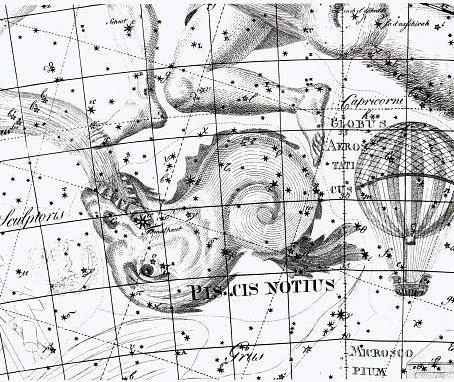 |
... In late September or early October
130, Hadrian and his entourage, among
them Antinous, assembled at Heliopolis
to set sail upstream as part of a
flotilla along the River Nile. The
retinue included officials, the Prefect,
army and naval commanders, as well as
literary and scholarly figures. Possibly
also joining them was Lucius Ceionius
Commodus, a young aristocrat whom
Antinous might have deemed a rival to
Hadrian's affections. On their journey
up the Nile, they stopped at Hermopolis
Magna, the primary shrine to the god
Thoth. It was shortly after this, in
October [in the year A.D.] 130 - around
the time of the festival of Osiris -
that Antinous fell into the river and
died, probably from drowning. Hadrian
publicly announced his death, with
gossip soon spreading throughout the
Empire that Antinous had been
intentionally killed. The nature of
Antinous's death remains a mystery to
this day, and it is possible that
Hadrian himself never knew; however,
various hypotheses have been put forward.
One possibility is that he was murdered
by a conspiracy at court. However,
Lambert asserted that this was unlikely
because it lacked any supporting
historical evidence, and because
Antinous himself seemingly exerted
little influence over Hadrian, thus
meaning that an assassination served
little purpose. Another suggestion is
that Antinous had died during a
voluntary castration as part of an
attempt to retain his youth and thus his
sexual appeal to Hadrian. However, this
is improbable because Hadrian deemed
both castration and circumcision to be
abominations and as Antinous was aged
between 18 and 20 at the time of death,
any such operation would have been
ineffective. A third possibility is that
the death was accidental, perhaps if
Antinous was
intoxicated.
However, in the surviving evidence
Hadrian does not describe the death as
being an accident; Lambert thought that
this was suspicious.
Another possibility is that Antinous
represented a voluntary human sacrifice.
Our earliest surviving evidence for this
comes from the writings of Dio Cassius,
80 years after the event, although it
would later be repeated in many
subsequent sources. In the second
century Roman Empire, a belief that the
death of one could rejuvenate the health
of another was widespread, and Hadrian
had been ill for many years; in this
scenario, Antinous could have sacrificed
himself in the belief that Hadrian would
have recovered. Alternately, in Egyptian
tradition it was held that sacrifices of
boys to the Nile, particularly at the
time of the October Osiris festival,
would ensure that the River would flood
to its full capacity and thus fertilize
the valley; this was made all the more
urgent as the Nile's floods had been
insufficient for full agricultural
production in both 129 and 130. In this
situation, Hadrian might not have
revealed the cause of Antinous's death
because he did not wish to appear either
physically or politically weak.
Conversely, opposing this possibility is
the fact that Hadrian disliked human
sacrifice and had strengthened laws
against it in the Empire
...

|
.jpg)
.jpg)
